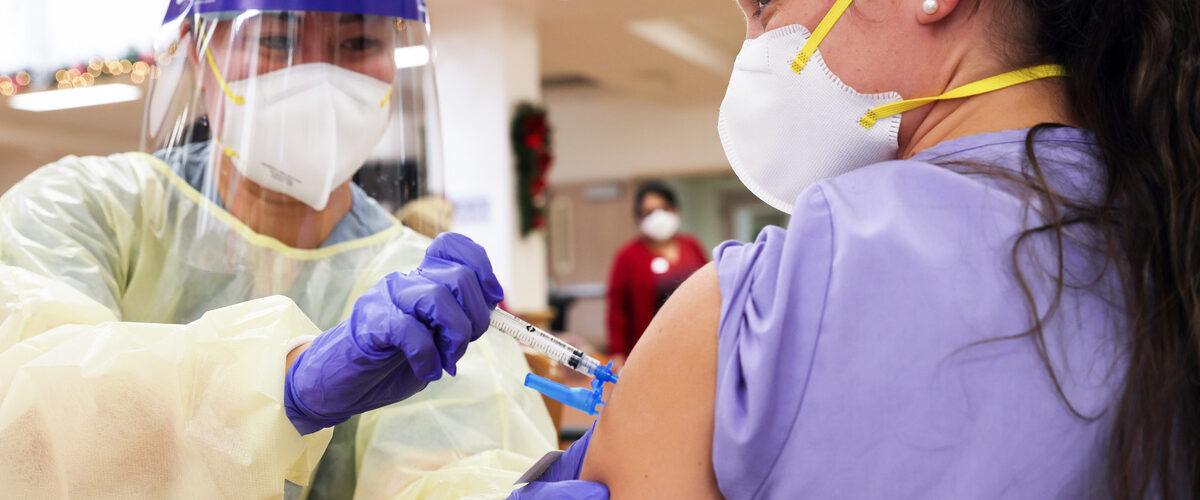• If you have a condition or taking medications that weaken your immune system, you may not be fully protected even if you are fully vaccinated. You should continue to take all precautions recommended for unvaccinated people, including wearing a well-fitted mask, until advised otherwise by their healthcare provider.
subsequently Can you still get COVID-19 after vaccine? Most people who get COVID-19 are unvaccinated. However, since vaccines are not 100% effective at preventing infection, some people who are fully vaccinated will still get COVID-19. An infection of a fully vaccinated person is referred to as a “breakthrough infection.”
How long will it take to build immunity after getting the COVID-19 vaccine? It takes time for your body to build protection after any vaccination. People are considered fully vaccinated two weeks after their second shot of the Pfizer-BioNtech or Moderna COVID-19 vaccine, or two weeks after the single-dose J&J/Janssen COVID-19 vaccine.
as well What does the COVID-19 vaccine do in your body? COVID-19 vaccines teach our immune systems how to recognize and fight the virus that causes COVID-19. Sometimes this process can cause symptoms, such as fever.
How long does it take for the body to produce antibodies against COVID-19?
Antibodies can take days or weeks to develop in the body following exposure to a SARS-CoV-2 (COVID-19) infection and it is unknown how long they stay in the blood.
How does the COVID-19 vaccine boost your immune system? Vaccines work by stimulating your immune system to produce antibodies, exactly like it would if you were exposed to the disease. After getting vaccinated, you develop immunity to that disease, without having to get the disease first.
identically Does an antibody test diagnose an active COVID-19? Antibodies can take several days or weeks to develop after you have an infection and may stay in your blood for several weeks after recovery. Because of this, antibody tests should not be used to diagnose an active coronavirus infection.
Do people produce COVID-19 antibodies after infection? Most people who’ve recovered from COVID-19 do make antibodies against the virus.
What is the COVID-19 antibody test?
An antibody test looks for antibodies that are made by the immune system in response to a threat, such as a specific virus. Antibodies can help fight infections. Antibodies can take several days or weeks to develop after you have an infection and may stay in your blood for several weeks after recovery. Because of this, antibody tests should not be used to diagnose an active coronavirus infection. At this time, researchers do not know if the presence of antibodies means that you are immune to the coronavirus in the future.
What does a positive COVID-19 antibody test result mean? A positive test result with the SARS-CoV-2 antibody test indicates that antibodies to SARS-CoV-2 were detected, and the individual has potentially been exposed to COVID-19.
Can you have COVID-19 and still test negative for antibody test?
A negative test means that you have no COVID-19 antibodies, so you probably were not infected with the COVID-19 virus in the past. Because it takes time for antibodies to develop, false-negative test results can happen if the blood sample is collected too soon after your infection started.
What is a false positive COVID-19 antibody test? Sometimes a person can test positive for SARS-CoV-2 antibodies when they do not actually have those specific antibodies. This is called a false positive.
What is the difference between testing positive for the COVID-19 antigen and antibody test?
A positive antigen test means that the person being tested has an active COVID-19 infection. A positive antibody test means that the person being tested was infected with COVID-19 in the past and that their immune system developed antibodies to try to fight it off.
What causes false negatives in COVID-19 antibody tests?
Having an antibody test too early can lead to false negative results. That’s because it takes a week or two after infection for your immune system to produce antibodies. The reported rate of false negatives is 20%.
